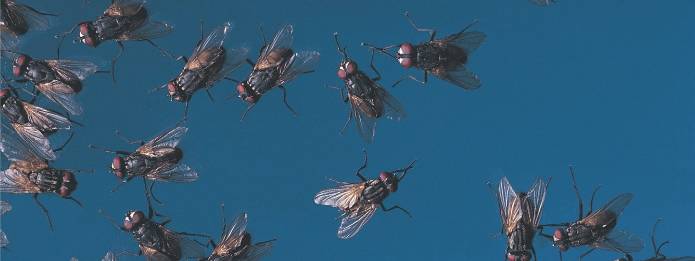
It is inevitable that during the later months of summer, particularly around August, those Cluster Fly numbers seem to increase, and start becoming an annoyance. Both rural and suburban homeowners are struck with this plague-like condition every year, with some desperate need for sustainable pest control measures. Finding these guys in your home is something that seems inescapable, as they try to find a warm place to hibernate through the winter. These warm and cozy spaces are usually found between bricks, and cracks in the foundation of a property, making them the ideal nook to sleep the winter cold away.
Unlike most other flies, cluster flies do not present people with any severe health concerns. They do not lay their eggs in food or feces, thus leaving them less likely to be the carrier of disease. Cluster flies emerge from their hibernation in early April, laying their eggs throughout the season until August rolls around again.
Cluster Fly Characteristics
Cluster flies have some rather unique and distinguishing features and characteristics that make them highly individual from the rest. Compared to the common house fly, cluster flies are slightly larger in size and have a darker appearance than their counterparts. They are also covered in a short fine golden coating of hairs, decorating their thorax. They are more often than not found to be living outdoors among fruits and flowers. During the late summer and early months of fall, cluster flies can be found to congregate along sunny walls to help combat and escape the coming cold. Although cluster flies do not pose any major health risks or hazards, having a quality professional pest removal company on-call may save you the inconvenience of additional pests. During warm and sunny days in winter, cluster flies often emerge and congregate against windows, causing an annoyance with all their buzzing. Furthermore, the bodies of the dead flies make a great meal for larder beetle larvae. Not having this pest under control can lead to some back-end problems in the long run.
Preventative Home Measures for Cluster Flies
A large problem that relates to the cluster fly, is that they lay their eggs in soil that is rich in earthworms, and are usually large grassy areas. Preventing these insects from entering your home is a pest control challenge all on its own, and is something that is going to need your attention and due care. Home remedies for an infestation are usually not the right way to go about it, as you will find these guys coming back from where they came, time after time, if not controlled correctly. Sealing gaps in the walls and flooring, repairing any broken screen doors and windows, as well as screening the vents in your roof are all relatively effective measure of prevention. The best pest control, however, should be done by professionals at Truly Nolen Canada.
Truly Nolen has the decades of knowledge, experience, and expertise to help you manage even the most overwhelming cluster fly infestations. Their pest control techniques and procedures are tried and tested and have the reputation to back it up.